
The Tower Hill Memorial is a pair of Commonwealth War Graves Commission memorials in Trinity Square Gardens, on Tower Hill in London, England. The memorials, one for the First World War and one for the Second, commemorate civilian, merchant seafarers and fishermen who were killed as a result of enemy action and have no known grave. The first, the Mercantile Marine War Memorial, was designed by Sir Edwin Lutyens and unveiled in 1928; the second, the Merchant Seamen's Memorial, was designed by Sir Edward Maufe and unveiled in 1955. A third memorial, commemorating merchant seamen who were killed in the 1982 Falklands War, was added to the site in 2005.
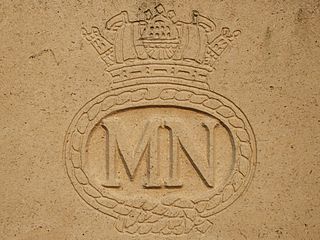
The British Merchant Navy is the collective name given to British civilian ships and their associated crews, including officers and ratings. In the UK, it is simply referred to as the Merchant Navy or MN. Merchant Navy vessels fly the Red Ensign and the ships and crew are regulated by the Maritime and Coastguard Agency (MCA), a specialist agency of the UK Department of Transport. British merchant ships are registered under the UK or Red Ensign group ship registries. British Merchant Navy deck officers and ratings are certificated and trained according to STCW Convention and the syllabus of the Merchant Navy Training Board in maritime colleges and other training institutes around the UK.

David Patrick Paul Alton, Baron Alton of Liverpool, KCSG, KCMCO is a British-Irish politician, formerly a Member of Parliament for the Liberal Party and later Liberal Democrat who has sat as a crossbench member of the House of Lords since 1997 when he was made a life peer. Alton is also known for his human rights work including the co-founding of Jubilee Action, the children's charity, and serves as chair, patron or trustee of several charities and voluntary organisations.

The National Union of Seamen (NUS) was the principal trade union of merchant seafarers in the United Kingdom from the late 1880s to 1990. In 1990, the union amalgamated with the National Union of Railwaymen to form the National Union of Rail, Maritime and Transport Workers (RMT).

British Chinese, also known as Chinese British or Chinese Britons, are people of Chinese – particularly Han Chinese – ancestry who reside in the United Kingdom, constituting the second-largest group of Overseas Chinese in Western Europe after France.

Repatriation is the return of a thing or person to its or their country of origin, respectively. The term may refer to non-human entities, such as converting a foreign currency into the currency of one's own country, as well as the return of military personnel to their place of origin following a war. It also applies to diplomatic envoys, international officials as well as expatriates and migrants in time of international crisis. For refugees, asylum seekers and illegal migrants, repatriation can mean either voluntary return or deportation.

Alfred Holt and Company, trading as Blue Funnel Line, was a UK shipping company that was founded in 1866 and operated merchant ships for 122 years. It was one of the UK's larger shipowning and operating companies, and as such had a significant role in the country's overseas trade and in the First and Second World Wars.
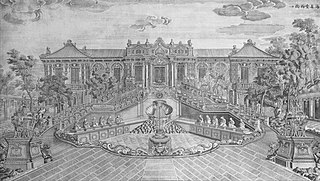
The Twelve Old Summer Palace bronze heads are a collection of bronze fountainheads in the shape of the Chinese zodiac animals that were part of a water clock fountain in front of the Haiyantang building of the Xiyang Lou area of the Old Summer Palace in Beijing. Believed to have been designed by the Jesuit Giuseppe Castiglione for the Qianlong Emperor, the statues would spout out water from their mouths to tell the time.
Sailors’ Society is an international Christian charity working in ports across the world. The organisation has chaplains and ship visitors in 91 global ports, who help seafarers and their families, from all faiths and none, with welfare and practical support.
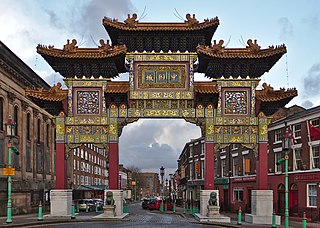
Chinatown is an area of Liverpool, England, that is home to the oldest Chinese community in Europe. Based in the south of the city centre, Chinatown has many Chinese businesses, restaurants and supermarkets, and facilities for the Chinese community. The area is also notable for its Chinese-style architecture; with the paifang on Nelson Street being the largest, multiple-span arch of its kind outside China.
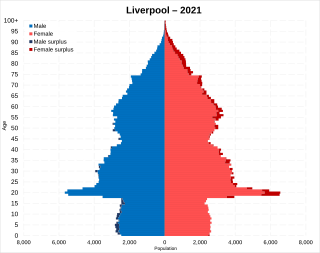
The demography of Liverpool is officially analysed by the Office for National Statistics. The Liverpool City Region is made up of Liverpool alongside the Metropolitan Boroughs of Halton, Knowsley, Sefton, St Helens, and the Wirral. With a population of around 496,784, Liverpool is the largest settlement in the region and the sixth largest in the United Kingdom.

The Maritime Labour Convention (MLC) is an International Labour Organization (ILO) convention, number 186, established in 2006 as the fourth pillar of international maritime law and embodies "all up-to-date standards of existing international maritime labour Conventions and Recommendations, as well as the fundamental principles to be found in other international labour Conventions". The other pillars are the SOLAS, STCW and MARPOL. The treaties applies to all ships entering the harbours of parties to the treaty (port states), as well as to all ships flying the flag of state party (flag states, as of 2021: over 97 per cent).
Chinese immigrants to the United Kingdom currently has more than 400,000, around 0.7% of the United Kingdom population.

Racism in the United Kingdom has a long history and includes structural discrimination and hostile attitudes against various ethnic minorities. The extent and the targets have varied over time. It has resulted in cases of discrimination, riots and racially motivated murders.

SS Westernland was a transatlantic ocean liner that was launched as Regina in Scotland in 1917, renamed Westernland in 1929 and was scrapped in 1947. She began her career as a troop ship repatriating US troops after the Armistice of 11 November 1918. In the Second World War, Westernland served as a troop ship, repair ship and destroyer depot ship.

A Sailortown is a district in seaports that catered to transient seafarers. These districts frequently contained boarding houses, public houses, brothels, tattoo parlours, print shops, shops selling nautical equipment, and religious institutions offering aid to seamen; usually there was also a police station, a magistrate's court and a shipping office. Because it took several days, in the past, to unload ships, crews would spend this time in sailortown. These were "generic locations—international everyplaces existing in nearly every port." Cicely Fox Smith wrote that 'dockland, strictly speaking, is of no country—or rather it is of all countries'". Sailortowns were places where local people, immigrants, social and religious reformers, and transitory sailors met.
Throughout the COVID-19 pandemic, the national and local governments of the Philippines have coordinated numerous international and domestic evacuations.
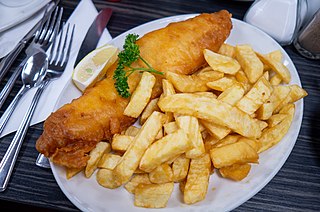
British Chinese cuisine is a style of Chinese cuisine developed by British Chinese people in the United Kingdom, typically adapted to British tastes but increasingly inspired by authentic Cantonese dishes. It is considered a major part of British cuisine. It often consists of fried food with the inclusion of chips and curry sauce, which are not known for being traditionally Chinese, but are food staples in the UK.
Samuel Chinque or Sam Chen was a British Chinese writer, publisher, social and political activist, and prominent trade unionist in the United Kingdom.
The Liverpool Chinese Seamen's Union was a trade union representing Chinese merchant seamen who lived in Liverpool.


















